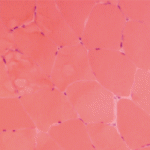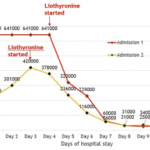Monitoring and Management
Other than avoiding use of a statin, there are no known therapies to prevent statin-induced myopathy.1,3 CoQ10 supplementation lacks strong scientific support for improving statin-induced myopathy and therefore is not widely recommended.1,2
Routine CK monitoring is not recommended, but baseline CK level may be obtained prior to commencing statin therapy in high-risk patients, or those already on agents known to cause myopathy.1,7 Symptoms of myalgia should be monitored during statin therapy with an attempt to use the lowest dose.1 Consider obtaining a CK level in patients with muscle-related symptoms. Discontinue the statin if a patient has a CK level > 10 X ULN with muscle soreness, tenderness, or pain. Evaluate muscle symptoms six to 12 weeks after starting therapy and at each follow-up appointment.3


